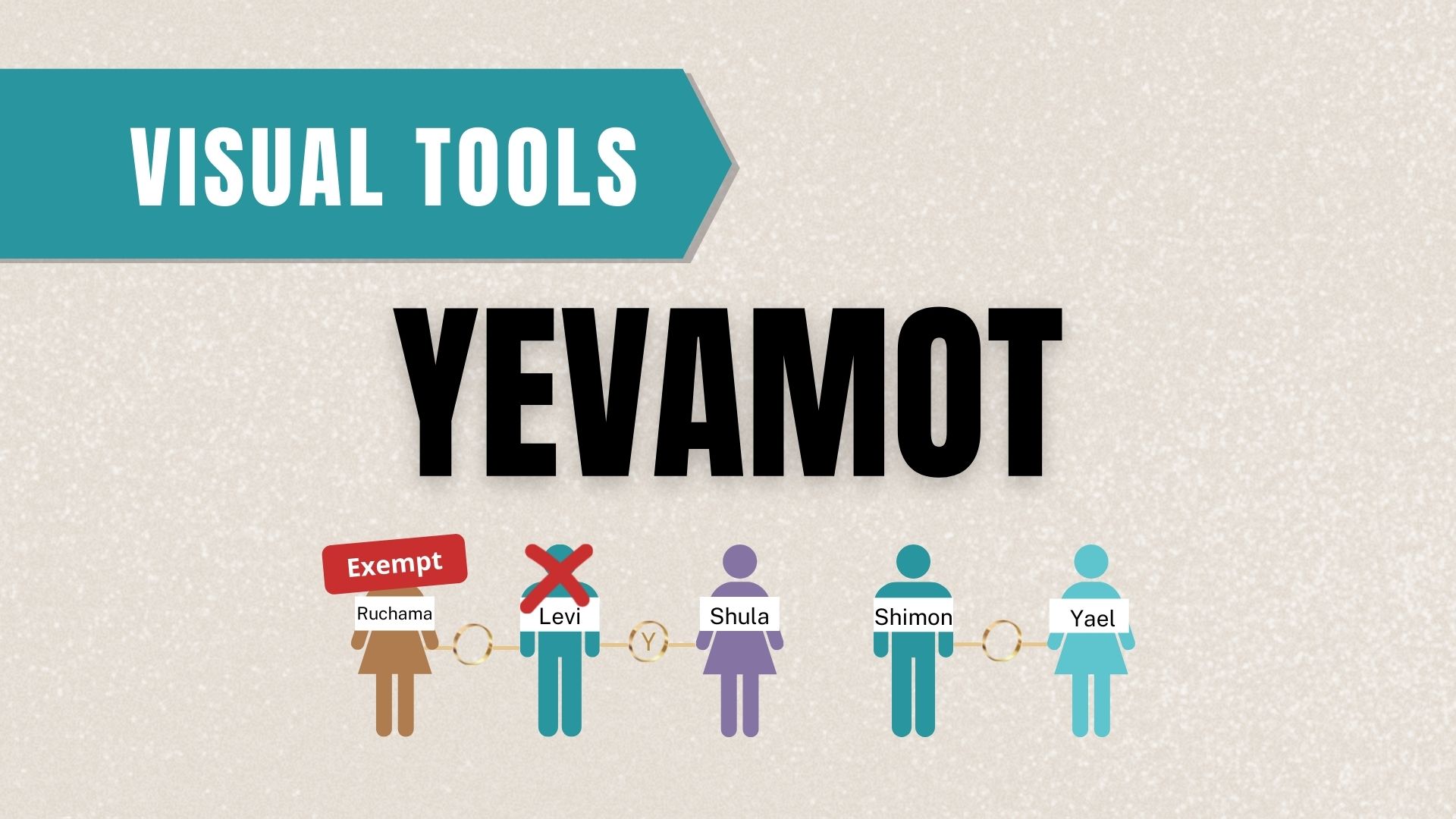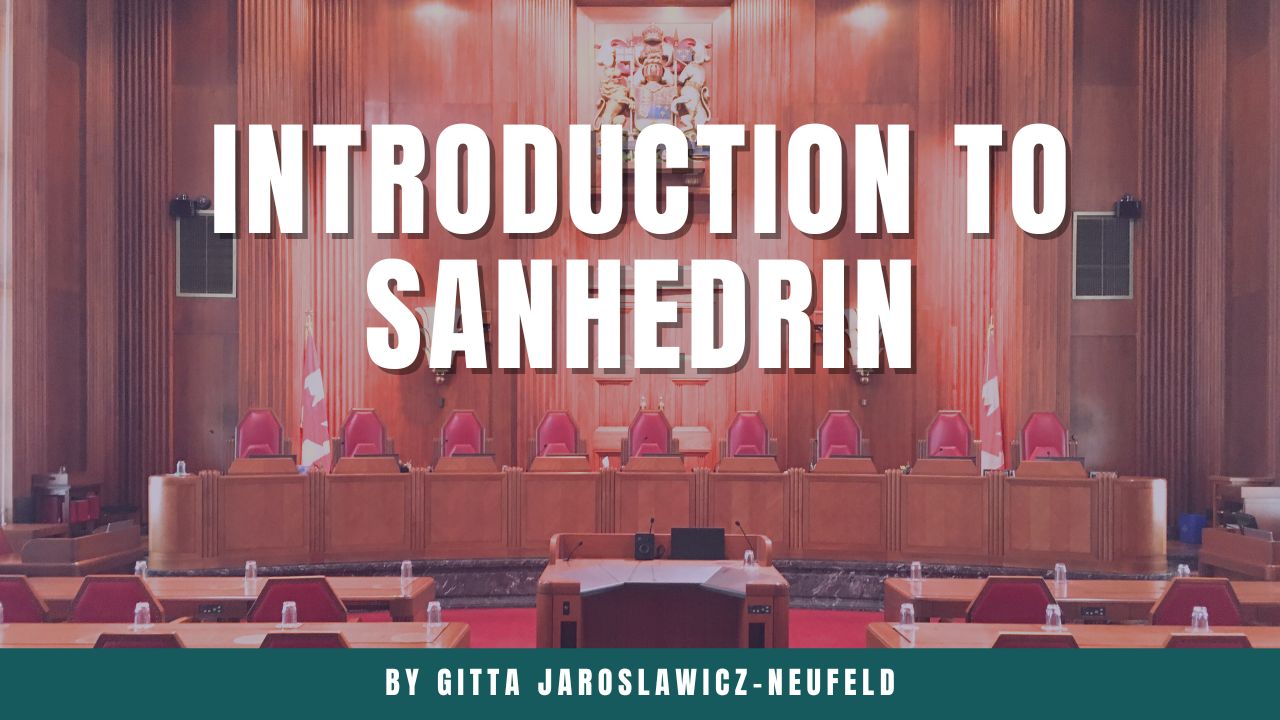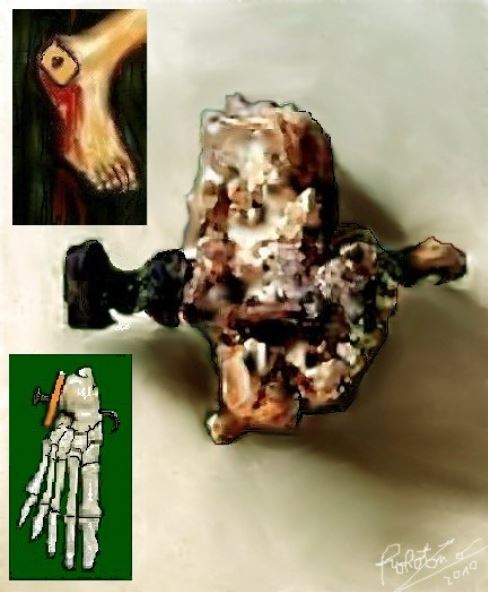The gemara continues its discussion regarding which sacrifices come with libations and which don’t and how many for each and where from the verses these laws are derived.
This week’s learning is sponsored for the merit and safety of Haymanut (Emuna) Kasau, who was 9 years old when she disappeared from her home in Tzfat two years ago, on the 16th of Adar, 5784 (February 25, 2024), and whose whereabouts remain unknown.
This week’s learning is dedicated of the safety of our nation, the soldiers and citizens of Israel, and for the liberation of the Iranian people. May we soon see the realization of “ליהודים היתה אורה ושמחה וששון ויקר”.
This week’s learning is sponsored for the merit and safety of Haymanut (Emuna) Kasau, who was 9 years old when she disappeared from her home in Tzfat two years ago, on the 16th of Adar, 5784 (February 25, 2024), and whose whereabouts remain unknown.
Want to dedicate learning? Get started here:


Today’s daily daf tools:
This week’s learning is sponsored for the merit and safety of Haymanut (Emuna) Kasau, who was 9 years old when she disappeared from her home in Tzfat two years ago, on the 16th of Adar, 5784 (February 25, 2024), and whose whereabouts remain unknown.
This week’s learning is dedicated of the safety of our nation, the soldiers and citizens of Israel, and for the liberation of the Iranian people. May we soon see the realization of “ליהודים היתה אורה ושמחה וששון ויקר”.
This week’s learning is sponsored for the merit and safety of Haymanut (Emuna) Kasau, who was 9 years old when she disappeared from her home in Tzfat two years ago, on the 16th of Adar, 5784 (February 25, 2024), and whose whereabouts remain unknown.
Today’s daily daf tools:
Delve Deeper
Broaden your understanding of the topics on this daf with classes and podcasts from top women Talmud scholars.
New to Talmud?
Check out our resources designed to help you navigate a page of Talmud – and study at the pace, level and style that fits you.
The Hadran Women’s Tapestry
Meet the diverse women learning Gemara at Hadran and hear their stories.
Menachot 91
הוֹאִיל וּכְתִיב ״וּמִן הַצֹּאן״, כְּמַאן דִּכְתִיב ״יַחְדָּו״ דָּמֵי.
Since in Leviticus 1:2 it is written: “And of the flock,” and not merely: Of the flock, it is as though the word: Together, was written in the verse. Therefore, the verse in Numbers 15, which does state: “Or of the flock,” is necessary to teach that this is not the case.
וּלְרַבִּי יֹאשִׁיָּה, דְּאָמַר: אַף עַל גַּב דְּלָא כְּתִיב ״יַחְדָּו״ כְּמַאן דִּכְתִיב ״יַחְדָּו״ דָּמֵי, לִיבְעֵי קְרָא!
The Gemara asks: And according to the opinion of Rabbi Yoshiya, who said that even though it is not explicitly written in the verse: Together, it is as though it is written: Together, i.e., it is presumed that the halakha is fulfilled only when both details are realized, a verse should be required. Yet, in the baraita, Rabbi Yoshiya expounds the phrase “of the herd or of the flock” to teach a different halakha. From where, then, does he derive that one who takes a vow to bring a burnt offering does not need to bring both types of animals?
הָכְתִיב: ״אִם עֹלָה קׇרְבָּנוֹ מִן הַבָּקָר״, ״וְאִם מִן הַצֹּאן קׇרְבָּנוֹ״.
The Gemara explains: Isn’t it written: “If his offering is a burnt offering of the herd” (Leviticus 1:3), and then in a separate verse it states: “And if his offering is of the flock” (Leviticus 1:9)? The fact that these possibilities are presented in two disjointed verses is an explicit indication that the burnt offering can be brought from even just one of these animals. Therefore, even Rabbi Yoshiya concedes that there is no reason to presume a burnt offering must be brought from both types there.
וְאִידָּךְ, אִיצְטְרִיךְ – סָלְקָא דַּעְתָּךְ אָמֵינָא: הָנֵי מִילֵּי בִּמְפָרֵשׁ, אֲבָל בִּסְתָמָא – לַיְיתֵי מִתַּרְוַיְיהוּ! קָא מַשְׁמַע לַן.
The Gemara asks: And as for the other tanna, Rabbi Yonatan, why does he require a verse at all? The Gemara explains: It was necessary to have a verse to teach this, because otherwise it might enter your mind to say: These statements, i.e., the verses that indicate it is sufficient to bring just one type of animal, concern a case where one specifies in his vow that he intends to bring just one animal, and the verses indicate that it is valid to bring just one. But if one vowed without specification, one might say: Let him bring burnt offerings from both of them. Therefore the phrase “of the herd or of the flock” teaches us that even in that case, it is sufficient to bring just one type of animal.
אָמַר מָר: תּוֹדָה מִנַּיִן? תַּלְמוּד לוֹמַר ״אוֹ זֶבַח״. אַטּוּ תּוֹדָה לָאו זֶבַח הוּא? אִיצְטְרִיךְ, סָלְקָא דַּעְתָּךְ אָמֵינָא: הוֹאִיל וְאִיכָּא לֶחֶם בַּהֲדַהּ – לָא תִּיבְעֵי נְסָכִים.
§ The Gemara continues to analyze the baraita. The Master said in the baraita: From where is it derived that a peace offering requires libations? The verse states: “A sacrifice.” From where is it derived that a thanks offering requires libations? The verse states: “Or a sacrifice.” The superfluous word “or” includes thanks offerings. The Gemara asks: Is that to say that a thanks offering is not referred to as a sacrifice? It certainly is. Why, then, is it only included through the word “or”? The Gemara answers: An independent inclusion was necessary, as it might enter your mind to say: Since in any event there is bread brought together with the thanks offering, it should not require libations.
וּמַאי שְׁנָא מֵאֵיל נָזִיר, דְּאִיכָּא בַּהֲדֵיהּ לֶחֶם, וּבָעֵי נְסָכִים?
The Gemara raises a question concerning this explanation: But in what way is a thanks offering different from a nazirite’s ram, as there is bread brought together with it also, and yet it requires libations? The verse states with regard to the ram of a nazirite: “And one unblemished ram for a peace offering, and a basket of unleavened bread, cakes of fine flour mixed with oil, and unleavened wafers spread with oil, and their meal offering, and their libations” (Numbers 6:13–15).
סָלְקָא דַּעְתָּךְ אָמֵינָא: הָתָם שְׁנֵי מִינִין, הָכָא אַרְבַּעַת מִינִין – קָא מַשְׁמַע לַן.
The Gemara answers: It might enter your mind to say that one should differentiate between the thanks offering and a nazirite’s ram as there, together with the nazirite’s ram, he brings only two types of bread, i.e., loaves and wafers, whereas, here, together with the thanks offering, one brings four types of bread. Therefore, one might have concluded that since there are many types of loaves it does not require libations. For that reason it is necessary to have an independent derivation that teaches us that it does require libations.
וְלִכְתּוֹב רַחֲמָנָא ״לְפַלֵּא נֶדֶר אוֹ לִנְדָבָה״, וְלָא בָּעֵי ״עֹלָה״?
The Gemara analyzes another one of the derivations of the baraita. The verse states: And you will make a fire offering to the Lord, a burnt offering, or a sacrifice, in fulfillment of a vow clearly uttered, or as a gift.” This teaches that an offering that comes in fulfillment of a vow or as a gift offering requires libations. The Gemara challenges: But if that is the halakha, then let the Merciful One write only: “In fulfillment of a vow clearly uttered, or as a gift,” and it would be unnecessary to write: “A burnt offering,” as a burnt offering is a type of offering that can be brought as a vow or gift offering.
אִי לָא כְּתַב רַחֲמָנָא ״עֹלָה״, הֲוָה אָמֵינָא: ״וַעֲשִׂיתֶם אִשֶּׁה לַה׳״ – כְּלָל, ״לְפַלֵּא נֶדֶר אוֹ לִנְדָבָה״ – פְּרָט, ״לְרֵיחַ נִיחֹחַ״ – חָזַר וְכָלַל, כְּלָל וּפְרָט וּכְלָל, אִי אַתָּה דָן אֶלָּא כְּעֵין הַפְּרָט: מָה הַפְּרָט מְפוֹרָשׁ דָּבָר שֶׁאֵינוֹ בָּא עַל חֵטְא, אַף כֹּל שֶׁאֵין בָּא עַל חֵטְא.
The Gemara explains: Had the Merciful One not written “a burnt offering,” I would say that the verse should be expounded as follows: “And you will make a fire offering to the Lord” is a generalization, indicating that all offerings require libations. But then it states: “In fulfillment of a vow clearly uttered, or as a gift,” which is a detail, indicating that the requirement applies only to offerings brought in fulfillment of a vow or as a gift. But with “to make a pleasing aroma to the Lord” it then generalized. If so, this is a generalization, and a detail, and a generalization, and according to the principles of exegesis you may deduce that the verse is referring only to items similar to the detail: Just as the detail is explicit in referring to an offering that does not come to atone for a sin, but comes to fulfill a vow or as a gift, so too any offering that does not come to atone for a sin requires libations.
אוֹצִיא חַטָּאת וְאָשָׁם, שֶׁהֵן בָּאִין עַל חֵטְא, אָבִיא בְּכוֹר וּמַעֲשֵׂר וָפֶסַח, שֶׁאֵין בָּאִין עַל חֵטְא – תַּלְמוּד לוֹמַר ״עֹלָה״.
Accordingly, I would exclude a sin offering and a guilt offering from the requirement to have libations, as they come to atone for a sin, and I would include the firstborn offering, the animal tithe offering, and the Paschal offering, as they do not come to atone for a sin. In order to preclude the possibility of expounding the verses in this way, the verse states: “Burnt offering,” as an additional detail, which serves to further exclude offerings that are brought only in fulfillment of an obligation.
הַשְׁתָּא דִּכְתִיב ״עֹלָה״, כְּלָל וּפְרָט, מָה מְרַבֵּית בֵּיהּ? מָה הַפְּרָט מְפוֹרָשׁ שֶׁאֵינוֹ מְחוּיָּיב וְעוֹמֵד, אַף כֹּל שֶׁאֵינוֹ מְחוּיָּיב וְעוֹמֵד.
The Gemara asks: Now that it is written: “Burnt offering,” what do you include through the generalization and detail and generalization in this verse? The Gemara explains: Just as the detail of a burnt offering is explicit in referring to an offering that one had not always been obligated to bring, as it is referring to a burnt offering brought in fulfillment of a vow, which one became obligated to bring only once the vow was taken, so too, any offering that one had not always been obligated to bring requires libations.
לְהָבִיא וַלְדוֹת קֳדָשִׁים, וּתְמוּרָתָן, וְעוֹלָה הַבָּאָה מִן הַמּוֹתָרוֹת.
This serves to include in the requirement for libations the offspring of consecrated animals, e.g., of a female peace offering; and substitutes of consecrated animals, i.e., a non-sacred animal with regard to which one stated that it should be a substitute for a consecrated animal, in which case the result is that both animals are consecrated and must be sacrificed; and a burnt offering that comes from the proceeds of having sold surpluses of items donated to the Temple that were not needed.
וְאָשָׁם שֶׁנִּיתַּק לִרְעִיָּה, וְכׇל הַזְּבָחִים שֶׁנִּזְבְּחוּ שֶׁלֹּא לִשְׁמָן.
And this also serves to include a guilt offering whose owner either died or achieved atonement through sacrificing another animal and which was therefore consigned to grazing until it developed a blemish, at which point it should be sold and the proceeds used to purchase supplementary offerings for the altar. If instead, the guilt offering itself was sacrificed as a burnt offering, it is valid. In such a case, the offering requires libations. And this also serves to include all offerings that were slaughtered not for their own sake. Such offerings were brought to fulfill the owner’s obligation. Since they were not sacrificed for the sake of that purpose, the owner does not fulfill his obligation, but nevertheless the offerings are valid. In such a case, these offerings also require libations.
וְהַשְׁתָּא דְּאָמְרַתְּ ״אוֹ״ לִדְרָשָׁא, לְפַלֵּא נֶדֶר אוֹ לִנְדָבָה, לְמָה לִי? לְחֶלְקָם. אִיצְטְרִיךְ, סָלְקָא דַּעְתָּךְ אָמֵינָא: עַד דְּמַיְיתֵי נֶדֶר וּנְדָבָה לָא לִיבְעֵי נְסָכִים, קָא מַשְׁמַע לַן דְּאַיְיתִי נֶדֶר לְחוֹדֵיהּ לִיבְעֵי נְסָכִים, וְאִי אַיְיתִי נְדָבָה לְחוֹדֵיהּ לַיְיתֵי נְסָכִים.
The Gemara asks: And now that you have said that the word “or” in the phrase “or a sacrifice” is necessary for the derivation that teaches that the thanks offering requires libations, I can similarly ask why do I need the word “or” in the phrase “in fulfillment of a vow clearly uttered or as a gift,” to separate between them? The Gemara explains: It was necessary to write “or” in that phrase, as it might enter your mind to say that until one brings both a vow offering and a gift offering together they do not require libations. The word “or” teaches us otherwise, that even if one brings a vow offering by itself it requires libations, and if one brings a gift offering by itself he must bring libations.
הָנִיחָא לְרַבִּי יֹאשִׁיָּה, אֶלָּא לְרַבִּי יוֹנָתָן לְמָה לִי? סָלְקָא דַּעְתָּךְ אָמֵינָא: אַיְיתִי נֶדֶר לְחוֹדֵיהּ – לִיבְעֵי נְסָכִים, אַיְיתִי נְדָבָה לְחוֹדֵיהּ – לִיבְעֵי נְסָכִים, אַיְיתִי נֶדֶר וּנְדָבָה – תִּיסְגֵּי בִּנְסָכִים דְּחַד, קָא מַשְׁמַע לַן.
The Gemara challenges: This works out well according to the opinion of Rabbi Yoshiya, as he holds that whenever the Torah does not explicitly separate between two details stated with regard to a halakha, it is presumed that the halakha is fulfilled only when both details are realized. But according to the opinion of Rabbi Yonatan, who holds that in general it is presumed that either detail is sufficient, why do I need the word “or”? The Gemara explains: Were it not for this word, it might enter your mind to say that although the halakha is that if one brings a vow offering by itself it requires libations, and if one brings a gift offering by itself it requires libations, nevertheless, if one brings both a vow offering and a gift offering together, it would be sufficient to bring libations for just one of them. Therefore, the word “or” teaches us that libations are required for each offering.
״אוֹ בְּמוֹעֲדֵיכֶם״ לְמָה לִי? סָלְקָא דַּעְתָּךְ אָמֵינָא: הָנֵי מִילֵּי דְּקָא מַיְיתֵי עוֹלָה בְּנֶדֶר וּשְׁלָמִים בִּנְדָבָה, אִי נָמֵי אִיפְּכָא.
The Gemara asks: Why do I need the word “or” in the phrase “or on your Festivals”? The Gemara answers: It was necessary, as it might enter your mind to say that this matter, that even when two offerings are brought together libations are required for each of them, applies only when they are distinct both in the type of offering and in the nature of the obligation to bring them, such as where one brings a burnt offering in fulfillment of a vow and a peace offering as a gift offering, or vice versa.
אֲבָל הֵיכָא דְּקָא מַיְיתֵי עוֹלָה וּשְׁלָמִים בְּנֶדֶר, אִי נָמֵי עוֹלָה וּשְׁלָמִים בִּנְדָבָה, שֵׁם נֶדֶר אֶחָד וְשֵׁם נְדָבָה אַחַת הִיא, וְתִיסְגֵּי לֵיהּ בִּנְסָכִים דְּחַד, קָא מַשְׁמַע לַן ״אוֹ בְּמוֹעֲדֵיכֶם״.
But where one brings a burnt offering and a peace offering both in fulfillment of a vow, or alternatively, a burnt offering and a peace offering both as gift offerings, one might have said that since in the former case both offerings are of a single type of commitment, i.e., a vow, and in the latter case both are of a single type of commitment, i.e., a gift offering, therefore it would be sufficient to bring libations for just one of them. Consequently, the word “or” in the phrase “or on your Festivals” teaches us that even if they are distinct only in the type of offering, libations are required for each offering.
״וְכִי תַעֲשֶׂה בֶן בָּקָר עֹלָה אוֹ זָבַח״, לְמָה לִי? אִיצְטְרִיךְ, סָלְקָא דַּעְתָּךְ אָמֵינָא: הָנֵי מִילֵּי הֵיכָא דְּקָא מַיְיתֵי עוֹלָה וּשְׁלָמִים בְּנֶדֶר, אִי נָמֵי עוֹלָה וּשְׁלָמִים בִּנְדָבָה.
The Gemara continues its analysis: Why do I need the word “or” in the verse: “And when you prepare a young bull for a burnt offering or for a sacrifice” (Numbers 15:9)? The Gemara explains: It was necessary, as it might enter your mind to say that this matter, that when two offerings are brought together libations are required for each of them, applies only when the two offerings are distinct in the type of offering, such as where one brings a burnt offering and a peace offering both in fulfillment of a vow, or alternatively, a burnt offering and a peace offering both as a gift offering.
אֲבָל הֵיכָא דְּקָא מַיְיתֵי שְׁתֵּי עוֹלוֹת, חֲדָא בְּנֶדֶר וַחֲדָא בִּנְדָבָה, אִי נָמֵי שְׁנֵי שְׁלָמִים, אֶחָד בְּנֶדֶר וְאֶחָד בִּנְדָבָה, אֵימָא שֵׁם שְׁלָמִים אַחַת הִיא, שֵׁם עוֹלָה אַחַת הִיא, וְתִיסְגֵּי לֵיהּ בִּנְסָכִים דְּחַד, קָא מַשְׁמַע לַן.
But where one brings two burnt offerings, one in fulfillment of a vow and one as a gift offering, or alternatively, two peace offerings, one in fulfillment of a vow and one as a gift offering, I would say that since in the former case both offerings are of a single type of offering, i.e., a peace offering, and in the latter case both offerings are of a single type of offering, i.e., a burnt offering, therefore it would be sufficient to bring libations for just one of them. Consequently, the word “or” teaches us that even if they are distinct only in the nature of the commitment to bring them, libations are required for each offering.
״לְפַלֵּא נֶדֶר אוֹ שְׁלָמִים״, לְמָה לִי? סָלְקָא דַּעְתָּךְ אָמֵינָא: הָנֵי מִילֵּי הֵיכָא דְּמַיְיתֵי שְׁתֵּי עוֹלוֹת, חֲדָא בְּנֶדֶר וַחֲדָא בִּנְדָבָה, אִי נָמֵי שְׁנֵי שְׁלָמִים, חֲדָא בְּנֶדֶר וַחֲדָא בִּנְדָבָה.
The Gemara continues: Why do I need the word “or” in the verse: “In fulfillment of a vow clearly uttered or for peace offerings” (Numbers 15:8)? The Gemara answers: It was necessary, as it might enter your mind to say that this matter, that when two offerings are brought together libations are required for each of them, applies only where two offerings are distinct from each other either in the nature of the commitment to bring them or in the type of offering, such as where one brings two burnt offerings, one in fulfillment of a vow and one as a gift offering, or alternatively, two peace offerings, one in fulfillment of a vow and one as a gift offering.
אֲבָל הֵיכָא דְּקָא מַיְיתֵי שְׁתֵּי עוֹלוֹת בְּנֶדֶר, וּשְׁתֵּי עוֹלוֹת בִּנְדָבָה, אִי נָמֵי שָׁנֵי שְׁלָמִים בְּנֶדֶר וּשְׁנֵי שְׁלָמִים בִּנְדָבָה, שֵׁם עוֹלָה אֶחָד הוּא וְשֵׁם נֶדֶר אֶחָד הוּא, וְתִיסְגֵּי לֵיהּ בִּנְסָכִים דְּחַד, קָא מַשְׁמַע לַן.
But where one brings two burnt offerings, both in fulfillment of a vow, or two burnt offerings, both as a gift offering, or alternatively, two peace offerings, both in fulfillment of a vow, or two peace offerings, both as a gift offering, I might have said with regard to the first of these cases that since both offerings are of a single type of offering, i.e., a burnt offering, and of a single type of commitment, i.e., a vow, and likewise with regard to the other cases, therefore, it would be sufficient to bring libations for just one of them. Consequently, the word “or” teaches us that even if the offerings are not distinct from each other at all, libations are nevertheless required for each one.
וְרַבִּי יֹאשִׁיָּה, הַאי ״מִן הַבָּקָר אוֹ מִן הַצֹּאן״ לְמָה לִּי?
The baraita teaches that according to Rabbi Yonatan, the word “or” in the phrase “of the herd or of the flock” teaches that one who takes a vow to bring a burnt offering fulfills his obligation even if he brings only one animal, either from the herd or from the flock. The Gemara asks: And as for Rabbi Yoshiya, why do I need the word “or” in this phrase “of the herd or of the flock”? Although the baraita explains that he expounds the phrase to teach that one does not bring libations with a bird offering, it does not explain what he derives from the word “or.”
סָלְקָא דַּעְתָּךְ אָמֵינָא: הָנֵי מִילֵּי [בִּתְרֵי מִינֵי, אֲבָל בְּחַד מִינָא – תִּסְגֵּי לֵיהּ בִּנְסָכִים דְּחַד, קָא מַשְׁמַע לַן.
The Gemara explains: The word “or” is necessary, as otherwise it might enter your mind to say that this matter, that when two offerings are brought together libations are required for each of them, applies only where one brings two kinds of animals, i.e., one from the flock and one from the herd; but where both animals are of a single kind, it would be sufficient for him to bring libations for just one of them. Therefore, the word “or” teaches us that even if the offerings are of the same kind of animal, libations are nevertheless required for each one.
״כָּכָה תַּעֲשׂוּ לָאֶחָד״, לְמָה לִי? סָלְקָא דַּעְתָּךְ אָמֵינָא: הָנֵי מִילֵּי] בְּזֶה אַחַר זֶה, אֲבָל בְּבַת אַחַת – תִּיסְגֵּי לֵיהּ בִּנְסָכִים דְּחַד; קָא מַשְׁמַע לַן.
Later in the passage concerning libations it states: “So shall be done for each young bull, or for each ram, or for each of the lambs, or of the goats. According to the number that you may prepare, so you shall do for each one according to their number” (Numbers 15:11–12). The Gemara asks: Why do I need this verse? The Gemara explains: It is necessary, as it might enter your mind to say that this matter, that when two offerings are brought together libations are required for each of them, applies only where the offerings were consecrated one after the other. But if they were consecrated at the same time, it would be sufficient for him to bring libations for just one of them. Therefore, the verse teaches us that in all cases, one must bring separate libations for each animal.
אֶלָּא שֶׁחַטָּאתוֹ שֶׁל מְצוֹרָע וַאֲשָׁמוֹ טָעוּן נְסָכִים, מְנָא הָנֵי מִילֵּי? דְּתָנוּ רַבָּנַן: ״וּשְׁלֹשָׁה עֶשְׂרוֹנִים סֹלֶת מִנְחָה״ – בְּמִנְחָה הַבָּאָה עִם הַזֶּבַח הַכָּתוּב מְדַבֵּר.
§ The mishna teaches that in general sin offerings and guilt offerings do not require libations. But the exception is that the sin offering of a leper and his guilt offering require libations. The Gemara asks: From where are these matters derived? They are derived from a verse, as the Sages taught in a baraita concerning the following verse, which details the offerings a leper is required to bring as part of his purification process: “And on the eighth day he shall take two unblemished male lambs, and one unblemished female lamb in its year, and three-tenths of fine flour for a meal offering, mixed with oil, and one log of oil” (Leviticus 14:10). The baraita explains: It is with regard to a meal offering that comes with an animal offering that the verse speaks, and so it is stating that each of the three offerings mentioned requires libations.
אַתָּה אוֹמֵר בְּמִנְחָה הַבָּאָה עִם הַזֶּבַח, אוֹ אֵינוֹ אֶלָּא בְּמִנְחָה הַבָּאָה בִּפְנֵי עַצְמָהּ? כְּשֶׁהוּא אוֹמֵר ״וְהֶעֱלָה הַכֹּהֵן אֶת הָעֹלָה וְאֶת הַמִּנְחָה״, הֱוֵי אוֹמֵר בְּמִנְחָה הַבָּאָה עִם הַזֶּבַח הַכָּתוּב מְדַבֵּר.
The baraita continues: Do you say that it is with regard to a meal offering that comes with an animal offering that the verse speaks? Or perhaps it is only with regard to a meal offering that comes by itself. When the verse states, in the continuation of that passage: “And the priest shall sacrifice the burnt offering and the meal offering” (Leviticus 14:20), which demonstrates that the meal offering accompanies the burnt offering, you must say that in the earlier verse as well it is with regard to a meal offering that comes with an animal offering that the verse speaks.
וַעֲדַיִין אֵינִי יוֹדֵעַ אִם טְעוּנָה נְסָכִים וְאִם לָאו, תַּלְמוּד לוֹמַר ״וְיַיִן לַנֶּסֶךְ רְבִיעִית הַהִין תַּעֲשֶׂה עַל הָעֹלָה אוֹ לַזָּבַח לַכֶּבֶשׂ הָאֶחָד״, ״עֹלָה״ – זוֹ עוֹלַת מְצוֹרָע, ״זָבַח״ – זוֹ חַטַּאת מְצוֹרָע, ״אוֹ לַזָּבַח״ – זוֹ אֲשַׁם מְצוֹרָע.
But still, I do not know whether this meal offering requires wine libations or whether it does not. Therefore, the verse states: “And wine for pouring a libation, a quarter-hin, you shall prepare with the burnt offering or for the sacrifice, for the one lamb” (Numbers 15:5). The verse is expounded as referring to each of the leper’s offerings: “The burnt offering”; this is referring to the burnt offering of a leper. “The sacrifice”; this is referring to the sin offering of a leper. And as for the word “or” in the phrase “or for the sacrifice,” this is referring to the guilt offering of a leper.
וְתִיפּוֹק לֵיהּ תַּרְוַיְיהוּ מִ״זָּבַח״,
The Gemara suggests: And let the tanna derive both the sin offering and the guilt offering from the word “sacrifice” alone, without relating to the word “or.”
דְּאָמַר מָר: חַטָּאת וְאָשָׁם מִנַּיִן? תַּלְמוּד לוֹמַר ״זָּבַח״.
This would be just as the Master said in a baraita concerning a nazirite: A nazirite who completes his term of naziriteship is required to shave his hair and bring various offerings. With regard to the shaved hair, the verse states: “And he shall take the hair of his nazirite head, and put it on the fire which is under the sacrifice of peace offerings” (Numbers 6:18). The baraita asks: From where is it derived that if, instead of putting his hair on the fire under the peace offering, he puts it on the fire under his sin offering or under his guilt offering, he still fulfills the obligation? The verse states: “The sacrifice,” which serves to include these two offerings. Evidently, the term “sacrifice” refers both to a sin offering and to a guilt offering. Why does the baraita concerning a leper derive a guilt offering only from the word “or”?
הָנֵי מִילֵּי הֵיכָא דְּתַרְוַיְיהוּ כִּי הֲדָדֵי נִינְהוּ, אֲבָל הֵיכָא דְּאָשָׁם לְהַכְשִׁיר וְחַטָּאת לְכַפֵּר – בָּעֵינַן תְּרֵי קְרָאֵי.
The Gemara explains: This matter, that both a sin offering and a guilt offering can be derived from the same term, applies only where they are both brought together, for the same purpose, as in the case of a nazirite. Both offerings serve to render him fit, in the case of a pure nazirite to partake of wine and cut his hair, and in the case of an impure nazirite to begin counting his term of naziriteship again. But in the case of a leper, where his guilt offering serves to render him fit to return to the camp and his sin offering serves to atone for the sin that was the cause of his leprosy, since they come for different purposes, we need two verses, i.e., sources, to teach about the two of them.
״זָבַח״ – זוֹ חַטַּאת מְצוֹרָע, וְאֵימָא זוֹ חַטָּאת וְאָשָׁם דְּנָזִיר.
The Gemara once again questions the derivations in the baraita: “The sacrifice”; this is referring to the sin offering of a leper. The Gemara asks: And how does the baraita know this? I could say instead that this is referring the sin offering and guilt offering of a nazirite. The sin offering is brought by a nazirite who completes his term of naziriteship, and the guilt offering is brought by a nazirite who became ritually impure. Accordingly, only those offerings of a nazirite would require libations, but not the burnt offering of a leper.
לָא סָלְקָא דַּעְתָּךְ, דְּתַנְיָא: ״וּמִנְחָתָם וְנִסְכֵּיהֶם״ – בְּעוֹלָתוֹ וּבִשְׁלָמָיו הַכָּתוּב מְדַבֵּר.
The Gemara rejects this possibility. This should not enter your mind, as it is taught in a baraita: In describing the offerings a nazirite brings upon the completion of his term of naziriteship, the verse states: “And he shall sacrifice his offering to the Lord, one unblemished male lamb in its year as a burnt offering, and one unblemished female lamb in its year as a sin offering, and one unblemished ram as peace offerings…and their meal offering, and their libations” (Numbers 6:14–15). The baraita explains that it is with regard to his burnt offering and his peace offering, mentioned earlier in that passage, that the verse speaks, and so it is only those nazirite offerings that require libations.
אַתָּה אוֹמֵר בְּעוֹלָתוֹ וּבִשְׁלָמָיו, אוֹ אֵינוֹ אֶלָּא אֲפִילּוּ חַטָּאת? תַּלְמוּד לוֹמַר: ״וְאֶת הָאַיִל יַעֲשֶׂה זֶבַח שְׁלָמִים וּמִנְחָתוֹ וְנִסְכּוֹ״.
Do you say that the verse speaks with regard to his burnt offering and his peace offering? Or perhaps the verse speaks even with regard to the sin offering that a nazirite brings if he becomes ritually impure? To preclude the possibility of explaining the verse in that way, the verse states in the subsequent verses: “And he shall make the ram a sacrifice of a peace offering to the Lord, with the basket of unleavened bread; and the priest shall offer its meal offering and its libations” (Numbers 6:16–17).
אַיִל בַּכְּלָל הָיָה, וְלָמָּה יָצָא? לְהַקִּישׁ אֵלָיו. מָה אַיִל מְיוּחָד בָּא בְּנֶדֶר וּנְדָבָה, אַף כֹּל בָּא בְּנֶדֶר וּנְדָבָה.
Now, this ram offering was already included with all other peace offerings, which all require libations. Why, then, was it singled out in this verse with an independent statement teaching that it requires libations? It was in order to equate all other offerings to it, teaching that the requirement of libations applies only to offerings similar to it. Just as a ram is distinct in that it can come in fulfillment of a vow or as a gift offering, so too, any offering that can come in fulfillment of a vow or as a gift offering requires libations. This excludes the sin offering and guilt offering of a nazirite, as they cannot be brought as vow offerings or gift offerings.
״עֹלָה״ – זוֹ עוֹלַת מְצוֹרָע, וְאֵימָא זוֹ עוֹלַת יוֹלֶדֶת?
The Gemara questions another of the derivations in the baraita: “The burnt offering”; this is referring to the burnt offering of a leper. The Gemara asks: And how does the baraita know this? I could say instead that this is referring the burnt offering of a woman who gave birth (see Leviticus 12:6), and if so, there would be no source to require libations for the burnt offering of a leper.
אָמַר אַבָּיֵי: עוֹלַת יוֹלֶדֶת מִסֵּיפָא דִּקְרָא נָפְקָא.
Abaye said: The requirement to bring libations with the burnt offering of a woman who gave birth is derived from the end of that verse, so the term “the burnt offering,” mentioned just before it, remains available to include the burnt offering of a leper in the requirement for libations.
דְּתַנְיָא, רַבִּי נָתָן אוֹמֵר: ״לַכֶּבֶשׂ״ – זוֹ עוֹלַת יוֹלֶדֶת, ״הָאֶחָד״ – זֶה אַחַד עָשָׂר שֶׁל מַעֲשֵׂר [שֶׁקָּרֵב שְׁלָמִים].
This is as it is taught in a baraita: The verse states: “And wine for pouring libations, a quarter-hin, you shall prepare with the burnt offering or for the sacrifice, for the one lamb” (Numbers 15:5). Rabbi Natan says: “For the one lamb”; this is referring to the burnt offering of a woman who gave birth and includes that offering in the requirement for libations. “The one”; this is referring to the eleventh animal of the animal tithe, which is sacrificed as a peace offering. In order to tithe his animals, the owner counts them one by one, and every tenth animal is consecrated as an animal tithe offering. If, when counting, he accidently counts the tenth animal as the ninth and the eleventh as the tenth, both are consecrated, the former as the animal tithe and the latter as a peace offering.
שֶׁלֹּא מָצִינוּ לָהּ בְּכׇל הַתּוֹרָה, שֶׁיְּהֵא טָפֵל חָמוּר מִן הָעִיקָּר.
The baraita comments: It is necessary to have an independent derivation to teach that the eleventh animal requires libations, because we do not find another halakha like this in the entire Torah, in which the ancillary case is more stringent than the principal case. In this case, the animal tithe offering itself does not require libations.
רָבָא אָמַר: אֵיזֶהוּ דָּבָר שֶׁצָּרִיךְ שְׁלֹשָׁה רִבּוּיִין? הֱוֵי אוֹמֵר: זוֹ מְצוֹרָע.
The Gemara presents another answer. Rava says: The verse is expounded to be referring to three different offerings and includes them in the requirement to bring libations. It is reasonable that these three offerings all share an association with each other. What is the only matter in which three offerings are brought that would necessitate three inclusions to teach that each of them require libations? You must say that this is the offerings of a leper, who brings three different offerings.
״לָאַיִל״, לְמָה לִי? אָמַר רַב שֵׁשֶׁת: לְרַבּוֹת אֵילוֹ שֶׁל אַהֲרֹן.
§ It is further stated in the passage concerning libations: “Or for a ram, you shall prepare a meal offering of two-tenths of an ephah of fine flour, mixed with one-third of a hin of oil” (Numbers 15:6–7). The details of the meal offering brought with a ram are also mentioned elsewhere: “And two-tenths of fine flour for a meal offering, mixed with oil, for the one ram” (Numbers 28:12); therefore, the Gemara asks: Why do I need the verse here to state this? Rav Sheshet says: This verse serves to include in the requirement for libations the ram of Aaron, i.e., the ram of the High Priest that he sacrifices as a burnt offering on Yom Kippur.
אֵילוֹ שֶׁל אַהֲרֹן, מִ״בְּמוֹעֲדֵיכֶם״ נָפְקָא! סָלְקָא דַּעְתָּךְ אָמֵינָא: הָנֵי מִילֵּי דְּצִבּוּר, אֲבָל דְּיָחִיד – לָא.
The Gemara challenges: But the requirement to bring libations with the ram of Aaron should be derived from the term: “On your Festivals” (Numbers 15:3), as the baraita derived from that term that all obligatory offerings of Festivals require libations. The Gemara resolves this challenge: It is necessary to have an independent derivation for the ram of Aaron, as it might enter your mind to say that this matter, that obligatory offerings of Festivals require libations, applies only to communal offerings, but not to offerings of an individual, such as the ram of Aaron.
וּמַאי שְׁנָא מֵעוֹלַת יוֹלֶדֶת?
The Gemara questions this: But why would one think that because the ram of Aaron is an offering of an individual it would not require libations? In what way is it different from the burnt offering of a woman who gave birth, which is also brought by an individual and yet it requires libations?
סָלְקָא דַּעְתָּךְ אָמֵינָא: הָנֵי מִילֵּי – דָּבָר שֶׁאֵין קָבוּעַ לוֹ זְמַן, אֲבָל דָּבָר שֶׁקָּבוּעַ לוֹ זְמַן – אֵימָא לָא. קָא מַשְׁמַע לַן.
The Gemara explains: It might enter your mind to say that this matter, i.e., the conclusion drawn from the halakha of the burnt offering of a woman who gave birth that even offerings of an individual require libations, applies only to an offering that does not have a fixed time when it must be sacrificed; but with regard to an offering that has a fixed time when it must be sacrificed, I might say that it does not require libations. Accordingly, it is necessary to have an independent derivation that teaches us that the ram of Aaron requires libations.
״אוֹ לָאַיִל״, לְמָה לִי? לְרַבּוֹת אֶת הַפַּלְגָּס.
The Gemara continues to expound the verse cited: Why do I need the word “or” in the phrase “or for a ram”? The Gemara explains: It serves to include the sacrifice of a palges in the requirement to bring libations. When referring to sheep, the Torah speaks only of lambs and rams. A sheep during its first twelve months is called a lamb, and one older than thirteen months is called a ram. A palges is a sheep in its thirteenth month and is never explicitly mentioned by the Torah. It is therefore necessary to have an independent derivation to teach that if one is sacrificed, libations must be brought with it.
הָנִיחָא לְרַבִּי יוֹחָנָן, דְּאָמַר בִּרְיָה הוּא, דִּתְנַן: הִקְרִיבוּ – מֵבִיא עָלָיו נִסְכֵי אַיִל, וְאֵינוֹ עוֹלֶה לוֹ מִזִּבְחוֹ, וְאָמַר רַבִּי יוֹחָנָן: ״אוֹ לָאַיִל״ – לְרַבּוֹת אֶת הַפַּלְגָּס.
The Gemara raises a difficulty: This works out well according to the opinion of Rabbi Yoḥanan, who said that a palges is considered an independent entity, i.e., it is not regarded as a lamb or a ram, as we learned in a mishna (Para 1:3): One who is obligated to sacrifice a lamb or a ram and sacrificed a palges should bring with it the libations that are required when bringing a ram, but nevertheless its sacrifice is not considered a fulfillment of his obligation to bring an offering of a ram or a lamb. And, commenting on this mishna, Rabbi Yoḥanan says that the requirement to bring libations in this case is derived from the phrase “or for a ram,” which serves to include the sacrifice of a palges.
אֶלָּא לְבַר פְּדָא, דְּאָמַר: מַיְיתֵי וּמַתְנֵי, דִּסְפֵיקָא הוּא, אִצְטְרִיךְ קְרָא לְרַבּוֹיֵי סְפֵיקָא?
But the need for an independent derivation is difficult according to the opinion of bar Padda; as he said that in the mishna’s case, the individual brings the libations of a ram but stipulates concerning them that if a palges is a ram, then all of the libations should be regarded as its libations, and if a palges is a lamb, then the quantity of those libations required for a lamb should be regarded as its libations and the rest should be regarded as a gift offering, because he holds that a palges is either a lamb or a ram but that it is uncertain to us which it is. According to bar Padda, one can ask: Is it necessary to have a verse to include an uncertain case? Although it is not known how to categorize a palges, it is included either in the category of a sheep or a ram, and its libations are therefore detailed in the verse.
וַדַּאי לְבַר פְּדָא קַשְׁיָא.
The Gemara concludes: Certainly, according to the opinion of bar Padda, this matter is difficult.
״כָּכָה יֵעָשֶׂה לַשּׁוֹר הָאֶחָד אוֹ לָאַיִל הָאֶחָד אוֹ לַשֶּׂה בַכְּבָשִׂים אוֹ בָעִזִּים״. ״לְשׁוֹר הָאֶחָד״ – מָה תַּלְמוּד לוֹמַר? לְפִי שֶׁמָּצִינוּ שֶׁחִלֵּק הַכָּתוּב בֵּין נִסְכֵי אַיִל לְנִסְכֵי כֶבֶשׂ, יָכוֹל נְחַלֵּק בֵּין נִסְכֵי פַר לְנִסְכֵי עֵגֶל – תַּלְמוּד לוֹמַר ״לַשּׁוֹר הָאֶחָד״.
§ The Gemara discusses another verse in the passage about libations: “So it shall be done for the one bull, or for the one ram, or for the kid of the lambs or of the goats” (Numbers 15:11). Ostensibly, this verse states nothing beyond that which has already been explained in the beginning of that passage, which delineates the requirement of libations for each type of animal offering. The Gemara asks: Why must the verse state: “For the one bull”? The Gemara answers: Since we have found the verse differentiates between the libations of a ram and the libations of a lamb, even though they are both sheep, one might have thought that we should likewise differentiate between the libations of a bull, which is in its second year, and the libations of a calf, which is still in its first year. Therefore, the verse states: “For the one bull,” teaching that there is one halakha for all bulls, including calves, i.e., the same requirement applies to them.
״אוֹ לָאַיִל״ – מָה תַּלְמוּד לוֹמַר? לְפִי שֶׁמָּצִינוּ שֶׁחִלֵּק הַכָּתוּב בֵּין נִסְכֵי בֶּן שָׁנָה לְנִסְכֵי בֶּן שְׁתַּיִם, יָכוֹל נְחַלֵּק בֵּין נִסְכֵי בֶּן שְׁתַּיִם לְנִסְכֵי בֶּן שָׁלֹשׁ? תַּלְמוּד לוֹמַר ״אוֹ לָאַיִל הָאֶחָד״.
The Gemara asks: Why must the verse state: “For the one ram”? The Gemara answers: Since we have found the verse differentiates with regard to sheep between the libations of a lamb in its first year and the libations of a ram in its second year, one might have thought that we should further differentiate with regard to rams themselves between the libations of a ram in its second year and the libations of a ram in its third year. Therefore, the verse states: “For the one ram,” teaching that there is one halakha for all rams.
״אוֹ לַשֶּׂה בַּכְּבָשִׂים״ – מָה תַּלְמוּד לוֹמַר? לְפִי שֶׁמָּצִינוּ שֶׁחִלֵּק הַכָּתוּב בֵּין נִסְכֵי כֶבֶשׂ לְנִסְכֵי אַיִל, יָכוֹל נְחַלֵּק בֵּין נִסְכֵי כִבְשָׂה לְנִסְכֵי רְחֵלָה? תַּלְמוּד לוֹמַר ״אוֹ לַשֶּׂה בַּכְּבָשִׂים״.
The Gemara asks: Why must the verse state: “For the kid of the lambs”? The Gemara answers: Since we have found that the verse differentiates with regard to male sheep between the libations of a male lamb and the libations of a ram, one might have thought that we should further differentiate between the libations of a female lamb and the libations of a ewe. Therefore, the verse states: “For the kid of the lambs.”
״אוֹ בָעִזִּים״ – מָה תַּלְמוּד לוֹמַר? לְפִי שֶׁמָּצִינוּ שֶׁחִלֵּק הַכָּתוּב בֵּין נִסְכֵי כֶבֶשׂ לְנִסְכֵי אַיִל, יָכוֹל נְחַלֵּק בֵּין נִסְכֵי גְדִי לְנִסְכֵי שָׂעִיר – תַּלְמוּד לוֹמַר ״אוֹ בָעִזִּים״.
The Gemara asks: Why must the verse state: “Or of the goats”? The Gemara answers: Since we have found that the verse differentiates with regard to sheep between the libations of a male lamb and the libations of a ram, one might have thought that we should further differentiate between the libations of a kid and the libations of an older goat. Therefore, the verse states: “Or of the goats.”
אָמַר רַב פָּפָּא: בָּדֵיק לַן רָבָא,
§ Having mentioned the libations of a ewe, the Gemara relates that Rav Pappa said: Rava tested us by asking the following question:









































